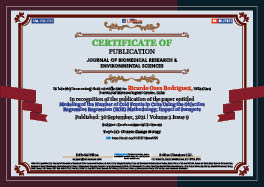Ricardo Oses Rodriguez*, Rigoberto Fimia Duarte and Alfredo Gonzalez Meneses
Volume2-Issue9
Dates: Received: 2021-09-24 | Accepted: 2021-09-30 | Published: 2021-09-30
Pages: 870-875
Abstract
The objective of this work is to model the variable number of cold fronts that affect the Cuban territory in a winter season for a long series of data, to establish if the trend is significant and to see which are the main statistics of the model, to observe the impact of prediction using the number of sunspots with the help of Objective Regressive ROR modeling. In this work, the series of cold fronts per season that affect the Cuban territory was modeled in the years from the 1916-1917 seasons to the 2006-2007 seasons. There are more moderate cold fronts than any other front, on average there are more classic fronts than any other type, on average 19 fronts can be presented per season with a standard deviation of 4.8 Sunspots and they only have a significant linear correlation with sunspots. In moderate fronts, as the stains increase, the number of fronts decreases. The ROR model explains 98% of the variance with an error of 4.2 cases and depends on the fronts returned in 5 seasons, which could coincide with the ENSO event, and also depends on the number of sunspots returned in 12 years. From 1916-1917 approximately the 1952-1953 season, moderate fronts predominated, later from 1953-1954 to the end of the data, weak fronts predominate over the rest with some exceptions throughout history. No significant trend was observed in the model. It is concluded that forecasts of the number of cold fronts can be made with the variable number of sunspots.
FullText HTML
FullText PDF
DOI: 10.37871/jbres1325
Certificate of Publication

Copyright
© 2021 Vajargah MF. Distributed under Creative Commons CC-BY 4.0
How to cite this article
Rodriguez RO, Duarte RF, Meneses AG. Modeling of the Number of Cold Fronts in Cuba Using the Objective Regressive Regression (ROR) Methodology; Impact of Sunspots. J Biomed Res Environ Sci. 2021 Sept 30; 2(9): 870-875. doi: 10.37871/jbres1325, Article ID: JBRES1325, Available at: https://www.jelsciences.com/articles/jbres1325.pdf
Subject area(s)
References
- Parry ML, Canziani OL, Palutikof JP, Linden, Hanson CE. Summary for policymakers. Climate change 2007: Impacts, adaptation and vulnerability. Contibution of working group II to the fourth assessment report of the intergovernmental panel on climate change. Cambridge University Press, Cambridge, UK. 2007. https://tinyurl.com/rmvurea4
- Metz B, Davidson OR, Boshc PR, Dave R, Meyer LA. Summary for policymakers. Climate change 2007: Mitigation. Contribution of working group III to the fourth assessment report of the intergovernmental panel on climate change. Cambridge University Press, Cambridge, United Kingdom and New York, NY, USA. 2007a.
- Llanes MT. Informativity and mean fields of the predictors for the rain forecast in three meteorological stations in Cuba. Cuban Journal of Meteorology. 2010;16(1).
- Oses R, Grau R. Regressive modeling (ROR), versus ARIMA modeling, using dichotomous variables in HIV mutations. Marta Abreu de las Villas Central University. Feijóo. 2011. ISBN:978-959-250-652-7.
- Oses. Modeling of the number of cold fronts in Cuba, impact of sunspots REDVET Rev. Electron. vet. 2012.
- Solomon S, Qin D, Manning M, Alley RB, Berntsen T, Bindoff NL, Chen Z, Chidthaisong A, Gregory JM, Hegerl GC, Heimann M. Technical summary in climate change 2007: The physical science basis. Contribution of working group i to the fourth assessment report of the intergovernmental panel on climate change. Cambridge University Press, Cambridge, UK. 2007. https://tinyurl.com/3bvnkkkj
- National Research Council. America’s climate choices. The National Academies Press. 2011. https://tinyurl.com/cbwt72vv
- National Research Council. Advancing the science of climate change. The National Academies Press. 2010. https://tinyurl.com/5wp6f3j9
- THE NATIONAL ACADEMIES PRESS: the effects of solar variability on earth’s climate: A workshop report National Academies Press, 500 Fifth Street, NW, Keck 360, Washington, DC 2001. https://tinyurl.com/32thbyfr
- Osés RR, Fimia DR, Aldaz CJW, Iannacone OJ, Zaita FY, Osés LC. Mathematical modeling of cholera through objective regressive regression and its relationship with climatic variables. The Biologist (Lima). 2017;15 (Special Supplement 1):128.
- Rigoberto DF, Ricardo OR, Ramón GG, Natividad HC, Meylin OM. The entomofauna of culicids and copepods approached from biological control alternatives to mathematical modeling in two central provinces of Cuba. Annals of the Academy of Sciences of Cuba. 2020;10(3).